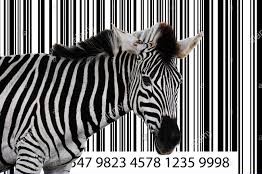Who Created Barcodes? What is GS1? Are they a part of the government?
By Erik Quisling
For more than 14 years I have been answering these two questions so let me sum up the answers as clearly as I can.
GS1 is not a governmental organization nor does it have any affiliation with the government whatsoever.
GS1 is the name of the private company that manages the barcoding system currently used by all retailers around the world. What is immediately confusing about GS1 is that for the first 30 years of their existence it was known as the Uniform Code Council (or UCC.)
UCC Changes Name to GS1
The UCC changed its name to GS1 about 10 years ago but is still often referred to as the UCC by many older business owners. It might not surprise you to learn that GS1 is actually owned and operated by Wal-Mart and four other retail giants including Kroger’s, Home Depot, Lowes, and the Federated Group. Together these companies make an enormous profit from their literal monopoly on the barcode system.
Who created the original barcoding system?
However, GS1 did not create this simple and powerful system of barcoding. The fist barcodes were actually invented back in 1951 by two scientists named Norman Joseph Woodland and Bernard Silver. But it wasn’t until the late 1960s that telecom giant GTE created a computer scanner that could actually read barcodes that they began to be used by retailers for inventory tracking purposes.
For years individual retailers devised their own internal systems for using barcodes since there was no universally standardized system of inventory management. So the original founders of GS1 actually came together to figure out a way to solve the chaotic inventory tracking problems faced by stores.
GS1's simple numbering system
What the founders of GS1 came up with was a very simple numbering system where every new company would get their own set of unique barcode numbers for their products when they buy barcodes. These barcode numbers (referred to as UPC barcodes or simply UPCs) would have to be purchased exclusively from GS1. This way, if all UPC barcodes originated from the GS1 database, they would know which barcode numbers were being used and which were not being used.
As long as every new business in the world purchased their UPC barcodes from GS1, the whole system would work beautifully. Amazingly, this is what GS1 was able to pull off. And the fact that GS1 got every retail business in the world to go along with this deserves a great deal of credit.
GS1's Monopoly
As GS1’s monopoly grew, so did its tendency to raise its prices. Today, they operate one of the craziest, most outlandishly expensive business models out there. Unfortunately, they are so expensive they have become a prohibitive expense for many people trying to start a new business.
Are There Alternatives to GS1?
(Now I can actually toot my own horn a bit.)
I originally became known as “The Barcode Guru” back in 1999 when I founded my company Buyabarcode.com. At the time I was the first to figure out a simple way to circumvent GS1’s monopoly without bringing chaos back into the inventory system. The system I came up with has been enormously successful and Buyabarcode.com has been fortunate enough to have been featured in both The Wall Street Journal and The Washington Post as the viable alternative to GS1.
First of all, let me re-state, it is very important that all barcodes originate from GS1. However, it is not necessary to purchase them directly from GS1, as long as the company you are purchasing your barcodes from originally purchased their barcodes from GS1.
For example, at Buyabarcode.com, all of the barcodes sold come directly from GS1. This way Buyabarcode.com knows that the barcodes have never been used before and that you can take it into 99.9% of all stores in the world and it will work perfectly.
Why only 99.9% you might ask? Well, as you may have suspected, it has to do with Wal-Mart and the other 4 stores who own GS1. With the growing success of Buyabarcode.com, Wal-Mart and its partners added a requirement to anyone wanting to sell products in their stores.
New vendors must provide a receipt as proof they purchased their barcodes directly from GS1 and not Buyabarcode.com. This way, they can help protect their lucrative monopoly on the barcode business.
Wal-mart - Kroger's - Home Depot - Lowes - Federated Group
So, plainly stated, if you want to sell your products in Wal-Mart and its 4 partners you do actually need to deal directly with GS1. These partners include Kroger’s, Home Depot, Lowes, and the Federated Group.
However, if you are not intending to sell at these 5 stores anytime in the near future, there is absolutely no need to go to GS1. Instead, you are able to take advantage of the services and savings you will get from Buyabarcode.com.
Buyabarcode.com also gives you the option of buying just one barcode at a time, if that is all you need. GS1, in comparison, makes entrepreneurs buy a minimum of 10 barcodes. If you purchase through them, you will have to spend anywhere from a minimum of $250 up to $15,000 for your block of barcodes.
This also does not include their annual renewal fees which can range from $50 to $3,500! For a small business owner, this price is daunting, especially after using the majority of your money to produce your product. Buyabarcode.com takes that problem away. The barcodes you purchase through Buyabarcode.com will never expire and there are never any annual renewal fees or future fees of any kind.
Also, just a word of caution, beware of bootleggers! With any business, you will have a few people out there that try to scam you out of your hard-earned money. These thieves are simply making up numbers out of thin air and creating barcodes out of them. They they sell these invalid barcodes for dirt cheap prices and in huge quantities.
This is proving to be an even bigger frustration for small businesses as these invalid UPC barcodes are rejected by retailers and they are forced to re-do their packaging.
The trusted alternative to GS1 and legitimate source for UPC barcodes
Buyabarcode.com is the trusted alternative to GS1 and legitimate source for UPC barcodes. We guarantee you will receive a 100% unique and GS-1 authorized barcodes. As of 2020, Buyabarcode.com has helped more than 100,000 businesses bring their products to market as a fast, simple inexpensive place to purchase UPC barcodes.
I hope this has helped clarify some of the questions you may have had about buying UPC barcodes and selling your products in stores.
Hope your day is prosperous and Happy Barcoding!
If you need more information on Amazon barcodes, please visit our page: https://www.buyabarcode.com/blog/how-to-get-an-amazon-barcode
For more information on Best Buy barcodes, please visit this page: https://buyabarcode.com/buy-best-buy-upc-barcode
To learn more about UPC barcodes for Jet, visit our page: https://buyabarcode.com/upc-codes-for-jet





